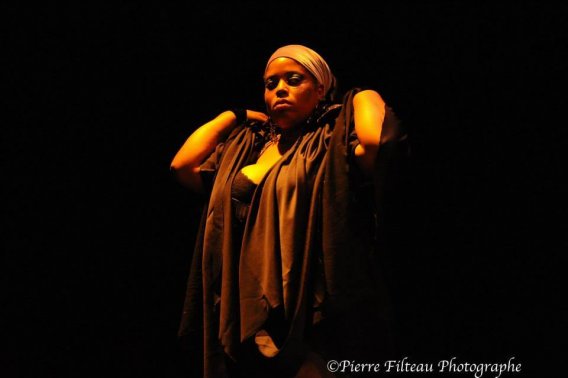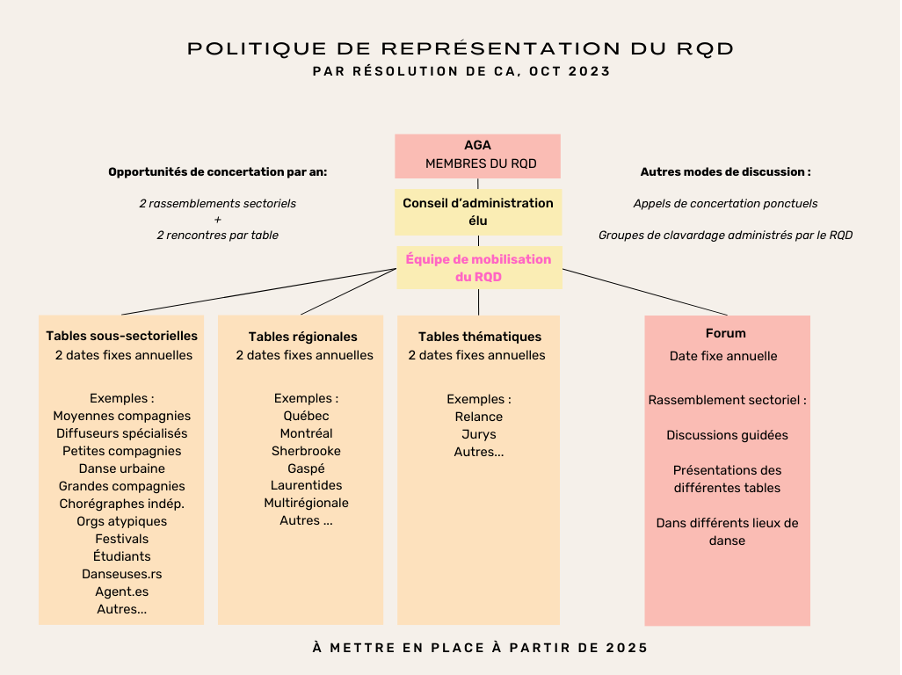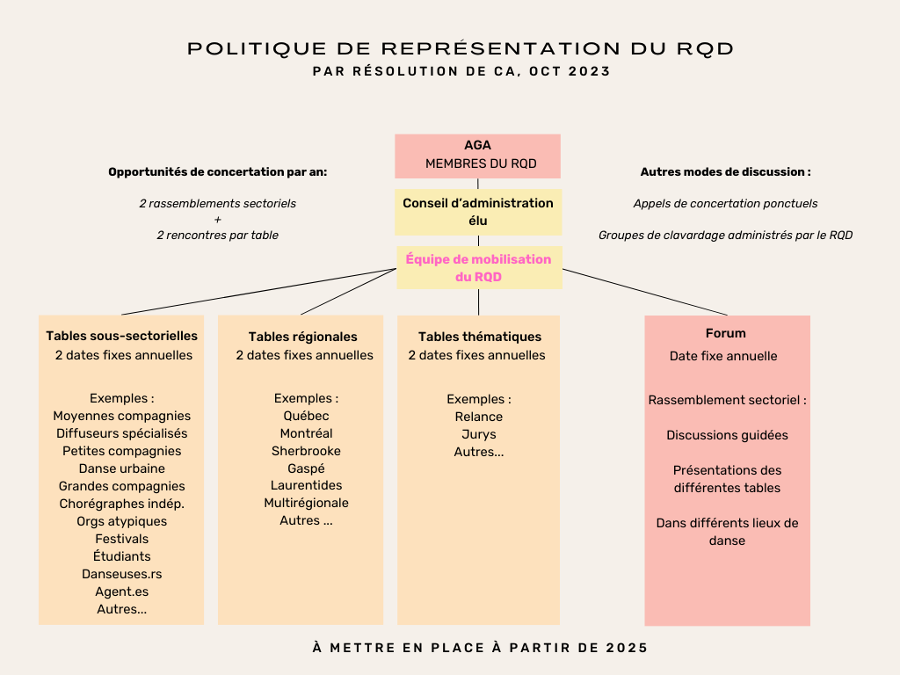Rqd Representation Policy – Adopted by Resolution of the Board of Directors on October 12, 2023
INTRODUCTION
Today, it is more important than ever for the Regroupement québécois de la danse (RQD) to adopt policies and methods that demonstrate that it is acting with all due diligence to mobilize its entire sector. The dissatisfaction felt by members belonging to the same sector towards those who represent them regularly results in the questioning of their organization’s representativeness policy(1). Indeed, the possibilities of encouraging the participation and representation of members of all associations constitute an ongoing, but not insurmountable, challenge. In these conditions, how can we ensure that the real needs of members are reflected in the RQD’s demands?
The RQD’s new representation policy, developed by management and the Board and to be implemented from 2025, aims to offer objectives in line with these challenges. This dynamic institutes a change of space, corresponding to best practices in representation. Focused on the needs of its members, it relies on interaction between dance professionals, mobilizes different types of knowledge and combines various strategies to generate the synergy of creating a collective intelligence(2). In fact, the implementation of the Regroupement’s representation policy is intended to be useful in appropriating new guidelines for the mobilization of its members, clarifying and harmonizing ways of better representing, and, gaining a common understanding of the issues facing the professional dance sector in order to improve the conditions of practice for its members. At the heart of this policy, consultation plays a key role in the emergence of better representation.
By outlining the components of the RQD’s representation policy, this guide is structured into five main sections :
- Concertation : what are we talking about at the RQD ?
- The main issues of representation at the RQD
- Implementation of an RQD representation policy
- How it works
- The objectives
- Expected results
CONCERT : WHAT ARE WE TALKING ABOUT AT THE RQD ?
As defined, the mission of the Regroupement québécois de la danse (RQD) is to bring together and represent individuals and professional organizations working in dance, with the aim of promoting the advancement and influence of choreographic art and contributing to the improvement of dance practice conditions. This mission highlights the fundamental ingredients of a concerted approach.
In a collaborative approach, the RQD stimulates the realization of a project shared by its members, with a view to achieving mutually beneficial results. This joint project is part of the socio-economic development of professional dance.
The culture of consultation at the RQD is above all a process of coming together to find “win/win” solutions to the issues and problems of professional dance practices through the sharing of knowledge. The importance of consultation at the RQD is fundamental to understanding the reality of the challenges facing the professional dance milieu, and to implementing appropriate solutions to foster the professional development and performance of our members. Associated with the idea of collective intelligence(3), it relies on the mutual commitment of members and requires trust and openness(2). It is inseparable from the notion of reciprocity: members engage in a collaboration where they receive and give(2).
Hence the importance of developing a concerted effort among Regroupement members to understand and represent the realitý of the professional dance milieu as each perceives it. However, actual representation raises major challenges.
THE MAIN CHALLENGES OF RQD REPRESENTATION
Based on the survey and the consultations held over the past year, our analyses reveal a number of factors likely to influence consultation between Regroupement members and their representation. We have identified the following issues as key to full and fair representation at the RQD :
- Trust, transparency and participation ;
- The different interests of the various groups in the eco-system ;
- Dual structure: individual and corporate members.
Trust, transparency and participation
Without a minimum level of trust, it is difficult for RQD members to communicate their knowledge and needs transparently. If the sharing of knowledge is not transparent, the consultation process may not achieve the desired results. Confidence in the process itself also encourages participation, as members will find it in their interest to contribute their knowledge to an initiative that is destined for success. Trust also refers to a collective environment in which we identify and which welcomes us. To this end, the RQD will continue to publicize its advocacy initiatives, communicate current cultural issues raised by the authorities, and work to ensure a collective environment conducive to empathetic, collegial and constructive discussion where different types of dance professionals can find their place. The diversity of consultation formats will also enable all players to contribute to the discussion, whether through virtual, face-to-face, formal or informal encounters. It will also be the duty of all members to keep abreast of RQD communications.
Different interests
A strength that could also become a weakness, the reality of different member interests can easily divide an industry group. On the other hand, by being an eco-system, we recognize the intimate link between each of our roles, and realize how much further we can advance by working together. By bringing players in the same field together (tables) and giving them the chance to come together (forums), we enable all players to advance their own needs as well as those supporting the sector as a whole.
Dual structure: individual and corporate members
The higher number of individual members than corporate members within the RQD, as well as the greater capabilities and assets of corporate members than individual members, are two factors that could cause a feeling of inequity among members. On the other hand, this structural reality is fluid, co-dependent and forms our evolving eco-system. It could serve us even better if we maximize synergies between different types of members and offer opportunities to understand and share different realities. Ensuring multiple opportunities for discussion and knowledge sharing (4 annual meetings and different discussion mechanisms) will serve to eliminate the perception of duality and help draw the necessary links between the two types of members. The thematic tables will also serve to ensure a mix.
IMPLEMENTATION OF A REPRESENTATION POLICY
The representation policy responds to the issues identified above by implementing factors that facilitate concerted action. With specialized group meetings (tables) and sectoral gatherings (forums), all managed and administered by the RQD to ensure focused and constructive discussions, we enable local players to find themselves as much among their counterparts as among all the players in the ecosystem, thus contributing to the elements necessary for greater confidence in the process and the players who participate in it.
In addition to the consultation system shown in the diagram and explained above, the RQD has :
- Set up dedicated contacts for corporate and individual members in its contact form, and
- Has added to its by-laws the requirement that at least 25% of corporate and individual members must be present to reach quorum at a meeting, and that both corporate and individual members must be present to reach quorum at Board meetings.
FUNCTION
Forums 1 and 2 are events that will bring the entire sector together in face-to-face or virtual mode on pre-determined sector themes, and to share the results of table discussions as well. These forums, led by the RQD, will enable a better understanding of the issues facing different member groups in a friendly, collegial setting. The forums will also provide an opportunity for sector players to discuss issues affecting the entire dance eco-system;
Sub-sector tables are groups within the eco-system that share common realities. Each table will have the opportunity to meet twice a year to determine its group’s priority issues and needs for advancement. The RQD will be present at these meetings and will take note of the issues and needs identified in order to feed its demands to official bodies;
Similarly, the regional tables will bring together all the dance players in a region or in different regional zones to discuss the challenges specific to the regional or multi-regional development of professional dance. The RQD will also be present to take note of the priority issues and needs identified, so that we can better lobby government authorities.
Thematic tables will be set up on an ad hoc basis, depending on current issues and the needs of the sector. They will be based on themes identified at forums or other consultation meetings, which could deal with specific topics such as peer jury structures or methods, new initiatives proposed for the development of the sector, etc. As with the other tables, the RQD will be present at these meetings to take note of the issues and needs of the sector. As with the other tables, the RQD will be present at these meetings to take note of the issues and needs identified.
The individuals who will be part of the tables will do so on a voluntary basis and will have to commit to ensuring a collegial, constructive and visionary environment, with the aim of delivering the elements necessary for the RQD to make an effective representation.
The different types of tables to be created will be suggested by the RQD, but can also be proposed by members.
As this is a new policy, the operation of these new methods will need to be fine-tuned and adjusted according to observations made along the way. The RQD invites members to contribute to the improvement of this representation policy and the consultation system put in place.
GOALS
The representation policy meets the following objectives :
- Ensuring full and fair representation on the RQD
- Offer all members the opportunity to consult and contribute to collective intelligence
- Structure a predictable, recurring consultation method with concise, clearly communicated deliverables
- Enabling greater transparency of RQD claims
- Enable the various players in the eco-system to hear and understand each other
RESULTS
The expected results of this policy are as follows :
- The RQD will respond more precisely to the needs and interests of the various groups in the sector
- A more receptive ear from the authorities following a robust consultation process
- A better understanding of the different realities that exist in the eco-system
- Greater intra-sector collaboration
- A greater sense of belonging to a mobilized professional community
- Increased confidence within the sector and in the RQD
- Increased solidarity in the sector
Other possible impacts include and are not limited to :
Sharing promising or innovative practices, experiences, lessons learned, advice or resources; networking and establishing links with peers more quickly; reducing isolation; solving cross-disciplinary problems; pooling resources to access rare knowledge; easier integration of new members into the field; helping each other; a collaborative climate.
Références:
(1) Leydet, D. (2002). Representation and presence : representative democracy in question. Politique et Sociétés, 21(1), 67–88.
https://doi.org/10.7202/040301ar
(2) INSPQ, (2017). The community of practice a relevant tool: summary of knowledge adapted to the public health context.
(3) Pierre, Deschenes. (2003). Some details on the labour-management consultation, Ministry of Labour
https://www.travail.gouv.qc.ca/fileadmin/fichiers/Documents/concertation/precisionscps.pdf




